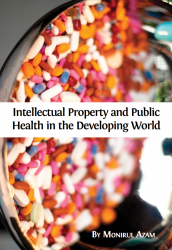
Author : Azam, Monirul
Publishing Date : Mar 20, 2023
"Across the world, developing countries are attempting to balance the international standards of intellectual property concerning pharmaceutical patents against the urgent need for accessible and affordable medicines. In this timely and necessary book, Monirul Azam examines the attempts of several developing countries to walk this fine line. He evaluates the experiences of Brazil, China, India, and South Africa for lessons to guide Bangladesh and developing nations everywhere. Azam's legal expertise, concern for public welfare, and compelling grasp of principal case studies make Intellectual Property and Public Health in the Developing World a definitive work. The developing world is striving to meet the requirements of the World Trade Organization's TRIPS Agreement on intellectual property. This book sets out with lucidity and insight the background of the TRIPS Agreement and its implications for pharmaceutical patents, the consequences for developing countries, and the efforts of certain representative nations to comply with international stipulations while still maintaining local industry and public health. Azam then brings the weight of this research to bear on the particular case of Bangladesh, offering a number of specific policy recommendations for the Bangladeshi government—and for governments the world over. Intellectual Property and Public Health in the Developing World is a must-read for public policy-makers, academics and students, non-governmental organizations, and readers everywhere who are interested in making sure that developing nations meet the health care needs of their people. "
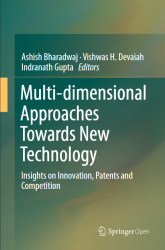
Author : Bharadwaj, Ashish
Publishing Date : May 15, 2023
This open access edited book captures the complexities and conflicts arising at the interface of intellectual property rights (IPR) and competition law. To do so, it discusses four specific themes: (a) policies governing functioning of standard setting organizations (SSOs), transparency and incentivising future innovation; (b) issue of royalties for standard essential patents (SEPs) and related disputes; (c) due process principles, procedural fairness and best practices in competition law; and (d) coherence of patent policies and consonance with competition law to support innovation in new technologies. Many countries have formulated policies and re-oriented their economies to foster technological innovation as it is seen as a major source of economic growth. At the same time, there have been tensions between patent laws and competition laws, despite the fact that both are intended to enhance consumer welfare. In this regard, licensing of SEPs has been debated extensively, although in most instances, innovators and implementers successfully negotiate licensing of SEPs. However, there have been instances where disagreements on royalty base and royalty rates, terms of licensing, bundling of patents in licenses, pooling of licenses have arisen, and this has resulted in a surge of litigation in various jurisdictions and also drawn the attention of competition/anti-trust regulators. Further, a lingering lack of consensus among scholars, industry experts and regulators regarding solutions and techniques that are apposite in these matters across jurisdictions has added to the confusion. This book looks at the processes adopted by the competition/anti-trust regulators to apply the principles of due process and procedural fairness in investigating abuse of dominance cases against innovators.
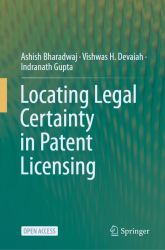
Author : Bharadwaj, Ashish Devaiah, Vishwas H. Gupta, Indranath
Publishing Date : May 15, 2023
This open access book presents global perspectives and developments within the information and communication technology (ICT) sector, and discusses the bearing they have on policy initiatives that are relevant to the larger digital technology and communications industry. Drawing on key developments in India, the USA, UK, EU, and China, it explores whether key jurisdictions need to adopt a different legal and policy approach to address the unique concerns that have emerged within the technology-intensive industries. The book also examines the latest law and policy debates surrounding patents and competition in these regions. Initiating a multi-faceted discussion, the book enables readers to gain a comprehensive understanding of complex legal and policy issues that are beginning to emerge around the globe.
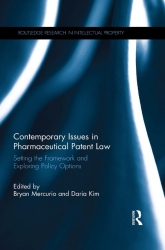
Author : Bryan Mercurio, Daria Kim
Publishing Date : Feb 17, 2017
This collection reflects on contemporary and contentious issues in international rulemaking in regards to pharmaceutical patent law. With chapters from both well-established and rising scholars, the collection contributes to the understanding of the regulatory framework governing pharmaceutical patents as an integrated discipline through the assessment of relevant laws, trends and policy options. Focusing on patent law and related pharmaceutical regulations, the collection addresses the pressing issues governments face in an attempt to resolve policy dilemmas involving competing interests, needs and objectives. The common theme running throughout the collection is the need for policy and law makers to think and act in a systemic manner and to be more reflective and responsive in finding new solutions within and outside the patent system to the long-standing problems as well as emerging challenges
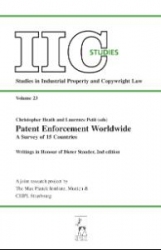
Author : Christopher Heath and Laurence Petit (eds)
Publishing Date : Sep 24, 2014
This book consists of a series of reports in which expert patent attorneys describe the patent infringement procedures in their jurisdiction. Since the first edition of this book was published in 2000, developments in the field of patent enforcement have been significant, requiring a major rewriting of all the seven original contributions (the UK, Germany, France, the Netherlands, Italy, Japan and the US). For this second edition, another eight countries have been included: Poland, the Czech Republic, Hungary, China, Korea, Argentina, Brazil, and Switzerland. There is also a new chapter by Dieter Stauder on European issues of patent enforcement: cross-border litigation, cross-border assistance in obtaining evidence, and the new European Enforcement Directive.

Author : Correa, Carlos M., Hilty, Reto M.
Publishing Date : Mar 20, 2023
This open access book is the outcome of a Global Forum on Innovation, Intellectual Property and Access to Medicines held in December 2019 at the Max Plank Instititute in Munich, organised by the South Centre and the Max Plank Institute. The academics and experts from international organisations participating have contributed chapters to this book. The book is for policy makers (in Ministries of Health, Ministries of Trade, Ministries of Foreign Affairs, patent offices), but also relevant for academics (law, trade, public health), on the flexibilities available in the Agreement on Trade Related Aspects of Intellectual Property Rights (TRIPS) of the World Trade Organization to promote access to medicines.
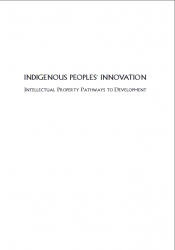
Author : Drahos, Peter; Frankel, Susy
Publishing Date : Mar 22, 2023
Traditional knowledge systems are also innovation systems. This book analyses the relationship between intellectual property and indigenous innovation.
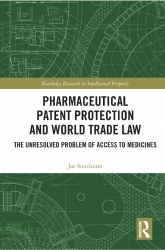
Author : Jae Sundaram
Publishing Date : May 08, 2018
Patents, including pharmaceutical patents, enjoy extended protection for twenty years under the TRIPs Agreement. The Agreement has resulted in creating a two-tier system of the World Trade Organisation Member States, and its implementation has seen the price of pharmaceutical products skyrocket, putting essential medicines beyond the reach of the common man. The hardest hit populations come from the developing and least developed countries, which have either a weak healthcare system or no healthcare at all, where access to essential and affordable medicines is extremely difficult to achieve.
Pharmaceutical Patent Protection and World Trade Law studies the problems faced by these countries in obtaining access to affordable medicines for their citizens in light of the TRIPS Agreement. It explores the opportunities that are still open for some developing countries to utilise the flexibilities available under the TRIPS Agreement in order to mitigate the damage caused by it. The book also examines the interrelationship between the world governing bodies, and the right to health contained in some of the developing country’s national constitutions.
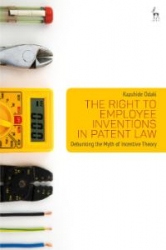
Author : Kazuhide Odaki
Publishing Date : Sep 24, 2018
Although employers are required to pay compensation for employee inventions under the laws in many countries, existing legal literature has never critically examined whether such compensation actually gives employee inventors an incentive to invent as the legislature intends.
This book addresses the issue through reference to recent, large-scale surveys on the motivation of employee inventors (in Europe, the United States and Japan) and studies in social psychology and econometrics, arguing that the compensation is unlikely to boost the motivation, productivity and creativity of employee inventors, and thereby encourage the creation of inventions. It also discusses the ownership of inventions made by university researchers, giving due consideration to the need to ensure open science and their academic freedom. Challenging popular assumptions, this book provides a solution to a critical issue by arguing that compensation for employee inventions should not be made mandatory regardless of jurisdiction because there is no legitimate reason to require employers to pay it. This means that patent law does not need to give employee inventors an ‘incentive to invent’ separately from the ‘incentive to innovate’ which is already given to employers.
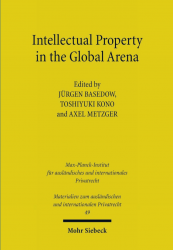
Author : Kono, Toshiyuki; Basedow, Jürgen; Metzger, Axel
Publishing Date : Mar 20, 2023
The private international law of intellectual property is currently much debated both in Europe and abroad. Art. 8 of the Rome II Regulation of 2007, which codifies a territorial approach for the infringement of intellectual property, has provoked an intensive discussion in Europe as to whether the lex loci protection is still appropriate for intellectual property litigation in the age of worldwide networks. A condensed outcome of this debate is summarized in the »Principles for Conflict of Laws in Intellectual Property« (CLIP Principles) drafted by the European Max Planck Group on Conflict of Laws in Intellectual Property (CLIP), published recently in a second preliminary draft. On the international scale, the American Law Institute's »Intellectual Property: Principles Governing Jurisdiction, Choice of Law, and Judgments in Transnational Disputes« of 2007 (ALI Principles) are the focal point of the debate. A Japanese project (»Transparency Proposal«) was finalized in 2009. This volume provides a comparative analysis of the three proposals. It compiles papers presented at an international conference held in Tokyo in May 2009.
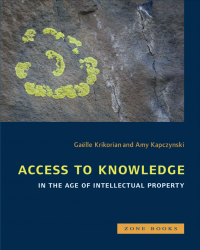
Author : Krikorian, Gaëlle; Kapczynski, Amy
Publishing Date : Mar 20, 2023
A movement emerges to challenge the tightening of intellectual property law around the world.At the end of the twentieth century, intellectual property rights collided with everyday life. Expansive copyright laws and digital rights management technologies sought to shut down new forms of copying and remixing made possible by the Internet. International laws expanding patent rights threatened the lives of millions of people around the world living with HIV/AIDS by limiting their access to cheap generic medicines. For decades, governments have tightened the grip of intellectual property law at the bidding of information industries; but recently, groups have emerged around the world to challenge this wave of enclosure with a new counter-politics of “access to knowledge” or “A2K.” They include software programmers who took to the streets to defeat software patents in Europe, AIDS activists who forced multinational pharmaceutical companies to permit copies of their medicines to be sold in poor countries, subsistence farmers defending their rights to food security or access to agricultural biotechnology, and college students who created a new “free culture” movement to defend the digital commons. Access to Knowledge in the Age of Intellectual Property maps this emerging field of activism as a series of historical moments, strategies, and concepts. It gathers some of the most important thinkers and advocates in the field to make the stakes and strategies at play in this new domain visible and the terms of intellectual property law intelligible in their political implications around the world. A Creative Commons edition of this work will be freely available online.
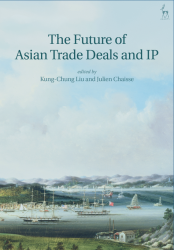
Author : Liu, Kung-Chung; Chaisse, Julien
Publishing Date : Mar 20, 2023
The first part of this open access book sets out to re-examine some basic principles of trade negotiation, such as choosing the right representatives to negotiate and enhancing transparency as a cure to the public’s distrust against trade talks. Moreover, it analyses how the Comprehensive and Progressive Agreement for the Trans-Pacific Partnership (CPTPP) might impact on the Regional Comprehensive Economic Partnership's (RCEP) IP chapter and examines the possible norm setters of Asian IP. It then focuses on the People's Republic of China's (PRC) trade and IP strategy against the backdrop of the power games between the PRC, India and the US. The second part of the book reflects on issues related to investor–state dispute settlement and its relationship with IP, such as how to re-calibrate the balance in international investment arbitration, and whether compulsory license of IP constitutes expropriation in India, the PRC and select ASEAN countries. The third part of the book questions and strives to improve some of the proposed IP provisions of CPTPP and RCEP and to redefine some aspects of international IP norms, such as: pre-grant patent opposition and experimental use exception; patent term extension; patent linkage and data exclusivity for the pharmaceutical sector; plant variety protection; pre-established damages for copyright infringement; and the restructuring of copyright limitations in the public interest. The open access edition of this book is available under a CC BY-NC-ND 3.0 licence on bloomsburycollections.com. Open access was funded by the Applied Research Centre for Intellectual Assets and the Law in Asia, School of Law, Singapore Management University.
123NextLast
